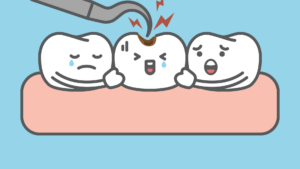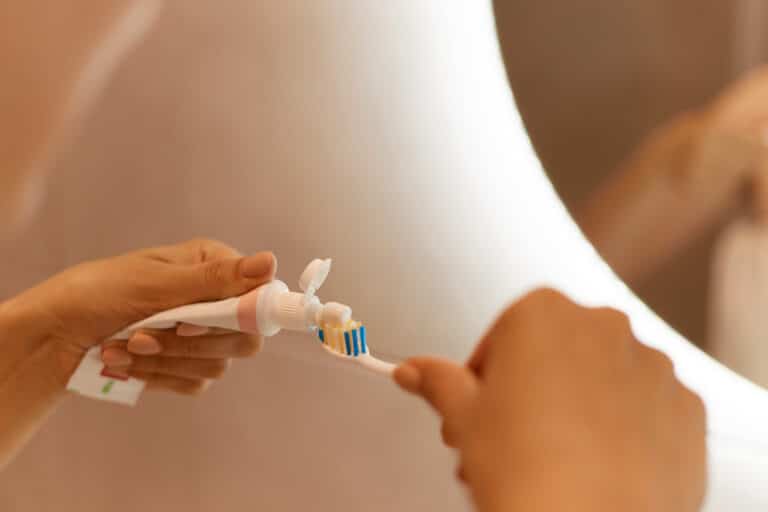If you’ve ever experienced a sudden, sharp jolt of pain when indulging in your favourite ice cream or sipping on a hot cup of coffee, you’re not alone. Tooth sensitivity is a common dental issue that affects countless individuals. In this comprehensive guide, we aim to answer your frequently asked questions about sensitive teeth, helping you understand its causes, symptoms, and potential treatments.
What causes sensitive teeth?
Dental abrasions
Dental abrasions occur when tooth enamel is worn away due to abrasive forces. One of the primary causes of dental abrasions is improper brushing techniques. Here’s how dental abrasions can develop:
1. Brushing too aggressively: Some individuals believe that brushing with more force ensures a cleaner mouth. However, brushing too aggressively can have the opposite effect. It leads to the wearing down of enamel, which is essential for protecting your teeth.
2. Using a hard-bristle toothbrush: While it may seem like a hard-bristle toothbrush would be more effective, it can actually harm your enamel. The hard bristles can cause significant abrasion over time, resulting in enamel loss.
To prevent dental abrasions:
- Choose a soft-bristle toothbrush, which is gentle on enamel but effective in cleaning your teeth.
- Adopt a proper brushing technique, using gentle, circular motions to remove plaque and debris without harming the enamel.
By being mindful of your brushing technique and the type of toothbrush you use, you can significantly reduce the risk of dental abrasions and the resulting tooth sensitivity.

Dental decay
Tooth decay, commonly known as cavities, is a prevalent cause of tooth sensitivity. It occurs when harmful bacteria in your mouth produce acids that eat away at the tooth’s enamel and dentin. As the decay progresses, it can reach the inner layers of the tooth, leading to discomfort and sensitivity.
Preventing dental decay is crucial to avoid sensitivity. To do this:
- Maintain a consistent oral hygiene routine, including regular brushing and flossing.
- Limit the consumption of sugary and acidic foods, which can contribute to decay.
- Schedule routine dental check-ups to catch and treat cavities in their early stages.
By addressing dental decay proactively, you can help prevent tooth sensitivity and maintain good oral health.
Gum disease
Gum disease encompasses conditions such as gingivitis and periodontitis. When these conditions develop, they can result in gum recession, a process where the gum tissue pulls away from the tooth, exposing the sensitive root surfaces. Gum recession is a leading cause of increased tooth sensitivity, especially when consuming hot or cold foods and beverages.
To prevent gum disease and the subsequent gum recession:
- Maintain thorough oral hygiene practices, including regular brushing and flossing.
- Schedule routine dental check-ups for early detection and treatment of gum disease.
- Follow your dentist’s recommendations for maintaining healthy gums.
By taking these steps, you can help prevent gum disease and the associated gum recession, ultimately reducing tooth sensitivity.
Coffee
Coffee is a beloved morning ritual for many, but its acidic nature can contribute to tooth sensitivity. The acidity in coffee gradually erodes tooth enamel over time. This erosion makes the dentin layer beneath more vulnerable to external stimuli, such as temperature changes or certain foods. To enjoy your coffee while minimising the risk of tooth sensitivity:
- Consider reducing the frequency of coffee consumption, especially if you have a history of enamel erosion.
- Drink coffee through a straw to limit its direct contact with your teeth.
- After enjoying your coffee, rinse your mouth with water to help neutralise acidity and reduce its impact on your teeth.
These steps can allow you to savour your daily brew without causing undue harm to your enamel or increasing tooth sensitivity.
Stress

Stress is a common and often underestimated factor that can significantly affect our oral health. The connection between stress and tooth sensitivity lies in how stress can lead to teeth grinding or clenching, a condition known as bruxism. When you’re stressed, you may unconsciously clench your teeth, often during sleep, or grind them during the day. This repetitive action exerts pressure on your teeth, causing enamel erosion over time. Enamel is the protective outer layer of your teeth, and when it wears down, it exposes the underlying dentin, which is much more sensitive. This can result in heightened tooth sensitivity and discomfort.
How can I identify sensitive teeth?
Identifying sensitive teeth is crucial for addressing the issue promptly. Here are some signs to watch for:
- Sudden pain: You experience sharp, shooting pain in response to hot, cold, sweet, or acidic foods and drinks.
- Pain while brushing: You feel discomfort when brushing your teeth, especially with cold water.
- Gum discomfort: Your gums may become sore, tender, or bleed during brushing.
- Tooth discolouration: Sensitive teeth can sometimes appear discoloured or transparent near the gumline.
What are the common symptoms of sensitive teeth?
When it comes to tooth sensitivity, the symptoms are typically hard to ignore. Common signs and symptoms include:
- Sensitivity to temperature: You may feel pain or discomfort when consuming hot or cold food and drinks.
- Sweet sensitivity: Sugary foods and drinks can also trigger sensitivity.
- Acidic foods: Citrus fruits and acidic beverages can worsen the condition.
- Air and cold water sensitivity: Breathing in cold air or rinsing with cold water can lead to discomfort.
- Pain when biting: Biting into hard or crunchy foods may cause a twinge of pain.
Can dental procedures cause tooth sensitivity?
It’s not uncommon to experience tooth sensitivity after certain dental procedures. While it’s usually a temporary issue, it’s essential to be aware of it. Some procedures that can cause temporary sensitivity include:
- Teeth whitening: Teeth whitening procedures, especially in-office treatments, can lead to post-treatment sensitivity. This discomfort typically subsides within a few days.
- Dental cleanings: Occasionally, a dental cleaning may temporarily increase sensitivity, especially if there’s a significant buildup of plaque and tartar.
- Fillings and crowns: After getting a filling or crown, you may experience mild sensitivity. This should improve within a short time.
- Tooth restoration: Procedures like root canals or periodontal treatments can lead to sensitivity during the healing process. Your dentist will advise you on managing this.
Can sensitive teeth be whitened?
One common concern is whether it’s possible to whiten sensitive teeth. The answer is yes! However, you should take precautions. Consider using a toothpaste designed for sensitive teeth, and consult your dentist before starting any whitening treatments. They can provide guidance on the most suitable and gentle approach for your situation.
Tip: Curious about teeth whitening? Learn more with our guide on “Everything you need to know about teeth whitening”!
Are over-the-counter toothpaste options effective for sensitive teeth?
Over-the-counter toothpaste specifically designed for sensitive teeth can provide relief for some individuals. These toothpaste options typically contain desensitising agents that help block the pain signals between the tooth’s nerve and the brain. While they may offer relief, it’s essential to understand that their effectiveness can vary from person to person.
If you’re considering using sensitive toothpaste, it’s best to consult with your dentist first. They can assess the severity of your sensitivity and recommend the most suitable product.
What dental treatments can help with sensitive teeth?
If over-the-counter toothpaste doesn’t provide the relief you need, your dentist can offer several treatment options to address tooth sensitivity:
- Desensitising agents: In-office desensitising treatments can be applied to the teeth to help block pain signals.
- Fluoride application: A professional fluoride treatment can strengthen tooth enamel and reduce sensitivity.
- Dental bonding: For more severe cases, your dentist may recommend dental bonding to cover exposed dentin and reduce sensitivity.
- Gum grafting: If gum recession is the issue, a gum graft can cover the exposed root surface, alleviating sensitivity.
- Root canal: In extreme cases where tooth sensitivity is caused by infection or nerve damage, a root canal may be necessary to eliminate the discomfort.

- Veneers: Veneers can also be a valuable option for those with sensitive teeth. These thin shells, custom-made for your teeth, can cover exposed dentin and reduce sensitivity.
Your dentist will assess your specific situation and recommend the most appropriate treatment plan. Book an appointment with our dentists to provide a personalised treatment plan for your needs.
Are there natural remedies to alleviate tooth sensitivity?
While professional dental treatments are often the most effective way to address tooth sensitivity, some natural remedies may provide temporary relief. These include:
- Saltwater rinse: Gargling with warm salt water can help reduce inflammation and provide relief.
- Cloves: Clove oil has natural numbing properties. Applying a small amount to the sensitive area can temporarily alleviate discomfort.
- Green tea: Green tea has anti-inflammatory properties that can help soothe sensitive teeth.
- Turmeric paste: A paste made from turmeric and water can be applied to the affected area to reduce inflammation and pain.
- Oil pulling: Swishing with coconut or sesame oil for 10-15 minutes may help reduce sensitivity.
While these natural remedies can offer some relief, do note that they are not a substitute for professional dental care.
What food or drinks should I avoid to reduce the likelihood of sensitive teeth?

1. Acidic foods and beverages:
- Citrus fruits: Oranges, lemons, grapefruits, and other citrus fruits are high in citric acid. While they provide essential vitamins, the acid can erode tooth enamel over time. If you enjoy citrus fruits, try to consume them in moderation and rinse your mouth with water afterward to minimise their impact.
- Vinegar: Vinegar, often found in salad dressings and pickled foods, is highly acidic and can contribute to enamel erosion. Be cautious when consuming vinegar-based products and consider using a straw to minimise contact with your teeth.
- Carbonated drinks: Soft drinks, including colas and sparkling water, are loaded with phosphoric and carbonic acids. These acids can weaken enamel and increase tooth sensitivity. Reducing or eliminating carbonated beverages from your diet can help protect your teeth.
2. Sugary snacks:
Excessive sugar consumption is detrimental to your dental health. Sugary snacks and beverages feed harmful oral bacteria, leading to the production of acid that attacks your tooth enamel. This can result in cavities and increased sensitivity. Foods to be cautious of include:
- Candies: Hard or chewy candies, lollipops, and other sweets are packed with sugar and should be enjoyed sparingly.
- Sugary drinks: Fruit juices, energy drinks, and sugary teas can be high in sugar content. Opt for sugar-free or lower-sugar alternatives.
- Pastries and cakes: Cakes, pastries, and other baked goods often contain high levels of refined sugars. Reducing your consumption of these treats is beneficial for your dental health.
3. Hot and cold extremes:
Consuming very hot or cold foods and drinks can trigger tooth sensitivity, especially if you already have sensitive teeth. It’s important to be mindful of extreme temperature variations, such as:
- Iced drinks: Be cautious with extremely cold beverages, particularly if you have sensitive teeth. Sipping through a straw can help minimise direct contact with your teeth.
- Hot soups and coffee: Extremely hot foods and drinks can cause discomfort if you have sensitive teeth. Allow them to cool slightly before consumption, and avoid sipping or biting into scalding items.
In addition to limiting or avoiding these foods and drinks, it’s essential to maintain good oral hygiene practices. Regular brushing and flossing, as well as routine dental check-ups, are crucial for preserving your oral health and reducing the likelihood of tooth sensitivity. If you have any concerns about your diet or dental health, consult with your dentist for personalised guidance and solutions.
What habits can help to reduce the likelihood of sensitive teeth?
- Avoid teeth grinding: Teeth grinding, or bruxism, is a significant contributor to tooth sensitivity. When you grind your teeth, you subject them to excessive force, which can lead to the wearing down of enamel. Prolonged enamel erosion can result in exposed dentin and increased sensitivity. To prevent this, it’s advisable to use a mouthguard, which acts as a protective barrier, preventing direct contact between your teeth and reducing the risk of enamel damage.
- Proper brushing technique: Adopting a proper brushing technique is crucial for preventing enamel erosion and tooth sensitivity. Using a soft-bristle toothbrush and gentle, circular motions during brushing is recommended. This technique effectively removes plaque and debris without causing undue harm to the enamel. It’s also essential to avoid aggressive brushing, as this can lead to enamel abrasion, a common cause of sensitivity.
- Regular dental check-Ups: Routine dental check-ups are essential for the early detection and management of dental issues that can lead to sensitivity. Your dentist can identify problems like tooth decay, gum disease, or enamel erosion before they progress to a point where sensitivity becomes a concern. By addressing these issues at an early stage, you can prevent further damage and discomfort.
- Use fluoride toothpaste: Fluoride toothpaste is a valuable tool for strengthening tooth enamel. It helps to remineralise enamel and make it more resilient to the effects of acid and wear. By using fluoride toothpaste as part of your daily oral care routine, you can maintain the health and integrity of your enamel, reducing the risk of sensitivity.
- Control stress: Managing stress is not just beneficial for your overall well-being but also for your oral health. Stress often leads to teeth grinding or clenching, which can damage enamel and expose the sensitive dentin. Finding healthy ways to manage stress, such as through relaxation techniques, exercise, or counselling, can help reduce bruxism and protect your teeth from sensitivity.
By following these guidelines, you can actively prevent tooth sensitivity and maintain good oral health. It’s important to remember that proactive care and a balanced approach to diet and lifestyle can go a long way in safeguarding your teeth against discomfort and sensitivity.
Is tooth sensitivity a sign of a more serious dental issue?
In some cases, tooth sensitivity can be an indicator of a more serious dental problem. It’s essential not to ignore persistent sensitivity, as it can be linked to issues such as:
- Tooth decay: Cavities can cause sensitivity, and untreated decay can lead to more severe problems.
- Gum disease: Periodontal disease can lead to gum recession and heightened sensitivity.
- Fractured teeth: Cracks or fractures in your teeth can exposed dentin, leading to sensitivity.
- Exposed tooth roots: Gum recession can expose the roots of your teeth, making them sensitive.
If your sensitivity persists or worsens, it’s crucial to seek professional dental advice.
Can sensitive teeth impact my overall oral health?
Yes, sensitive teeth can indeed impact your overall oral health. When you experience discomfort from tooth sensitivity, you may adjust your oral hygiene routines or dietary choices, inadvertently neglecting essential aspects of your oral care. Over time, this can lead to:
- Poor oral hygiene: Avoiding certain areas or brushing too lightly due to sensitivity can lead to plaque buildup and cavities.
- Dietary changes: Changing your diet to avoid sensitive triggers may result in missing out on essential nutrients.
- Dental health neglect: Ignoring sensitivity can lead to more severe dental issues that require extensive treatment.
To maintain your oral health, it’s essential to address tooth sensitivity promptly and work with your dentist to find effective solutions.
Embracing a sensitivity-free smile: Your path to dental comfort
Tooth sensitivity can be a bothersome and painful issue, but it’s also highly manageable with the right knowledge and care. Understanding the causes, symptoms, and potential treatments for sensitive teeth is the first step towards a pain-free smile. Remember, consulting with your dentist is essential for tailored advice and treatment options. By taking the necessary steps, you can enjoy your favourite foods and drinks without the discomfort of tooth sensitivity.


